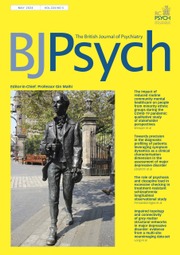- ISSN: 0007-1250 (Print), 1472-1465 (Online)
- Frequency: 12 issues per year
The British Journal of Psychiatry (BJPsych) is a leading international peer-reviewed journal, covering all branches of psychiatry with a particular emphasis on the clinical aspects of each topic. Published monthly on behalf of the Royal College of Psychiatrists, the journal is committed to improving the prevention, investigation, diagnosis, treatment, and care of mental illness, as well as the promotion of mental health globally. In addition to authoritative original research articles from around the world, the journal publishes editorials, review articles, commentaries on contentious articles, a comprehensive book review section and a lively, well-informed correspondence column. BJPsych is essential reading for psychiatrists, clinical psychologists, and all professionals with an interest in mental health.
Digital archives
Digital archives are available for this journal, providing instant online access to a repository of high-quality digitised historical content. For more information, please see the Cambridge journals digital archive.
The British Journal of Psychiatry was originally founded in 1853 as the Asylum Journal and was known as the Journal of Mental Science from 1858 to 1963. The complete archive of contents between 1855 and 2000 has been digitised.
Content preservation
Cambridge University Press publications are deposited in the following digital archives to guarantee long-term digital preservation:
- CLOCKSS (journals)
- Portico (journals and books)
Focus
The British Journal of Psychiatry (BJPsych) is a leading international peer-reviewed journal, covering all branches of psychiatry with a particular emphasis on the clinical aspects of each topic.
Mission
The journal is committed to improving the prevention, investigation, diagnosis, treatment, and care of mental illness, as well as the promotion of mental health globally.
Audience
The journal is essential reading for psychiatrists, clinical psychologists, and all professionals with an interest in mental health. The print version of BJPsych is sent to all members of the Royal College of Psychiatrists, which includes most psychiatrists working in the UK. There is also a substantial international subscriber base.
Ownership & Management
The journal is owned and managed by the Royal College of Psychiatrists and published monthly by Cambridge University Press on behalf of the College. The College grants editorial freedom and independence to the Editor-in-Chief of BJPsych.
Revenue Sources
Both the Royal College of Psychiatrists and Cambridge University Press are not-for-profit organisations, committed to fulfilling their respective objectives of securing the best outcomes for people with mental illness, learning difficulties and developmental disorders and advancing learning, knowledge and research worldwide .
BJPsych receives revenue to ensure we can maintain the highest publishing quality and standards. Revenue sources include: individual and institutional subscriptions; advertising; sales of reprints, rights and royalties; and open access fees. For details on how we avoid charging subscribers for content that has been made Open Access through the payment of an Article Processing Charge ('double dipping'), please see our transparent pricing policy. Please find information about our advertising procedures and guidelines here .
Press and Embargoes
Upon acceptance, BJPsych articles may be selected for press release by the author's institution, the RCPsych media team (press@rcpsych.ac.uk), or CUP media team (societymarketing@cambridge.org). The press release will be distributed under strict embargo, usually with advance access to the full article. Those registered to receive our press releases understand that the embargo is a strict one, and that no information about the article can be published or broadcast until the embargo has lifted. Journalists can contact the authors for comment or further details before the embargo date.
Disclaimer
BJPsych is not responsible for statements made by contributors. Unless so stated, material in this journal does not necessarily reflect the views of the Editor-in-Chief or the Royal College of Psychiatrists. The publishers are not responsible for any error of omission or fact.
- On the cover
-
Cover picture Conversation. 1990. William Utermohlen
In 1995 the artist, William Utermohlen was diagnosed with Alzheimer's disease. Signs of his illness are retrospectively apparent in his works of 1990-91, notably in the “Conversation Pieces”. These paintings, which can be seen as a celebration of William and his wife, Patricia's life together, describe the warmth and happiness of their apartment and the joy they took in the companionship of friends. However, signs of the disease that was about to strike William are also apparent in the shifting perceptions of space, objects, and people. They are premonitions of a new world of silence and sensory deprivation about to close in on the artist. Clearly the artist's most openly biographical pictures, this cycle centres on his wife, his friends, and his immediate environment: the objects, books, and paintings that have made his life meaningful and towards which he feels the greatest attachment.
In this painting, the artist seems inspired by the traditional composition of the Christian Annunciation, in which the angel Gabriel generally appears on the left lifting his hand towards the Virgin Mary who responds to his symbolic message seated on the right. In his personal version of an “Annunciation”, Utermohlen uses the portrait of a close friend, James, gesturing across the table to the artist's wife, Patricia, who appears both thoughtful and puzzled. In the background behind James, a mirror reflects the entrance to the artist's studio.
To my mind, “Conversation” is the painting in which the artist visually communicates or announces to his wife, his consciousness of an inner disturbance that he feels intensely but can no longer articulate verbally.
Chris Boïcos
Acknowledgments
Photo Credit: Chris Boïcos Fine Arts, Paris and Patricia Utermohlen.
We are always looking for interesting and visually appealing images for the cover of the Journal and would welcome suggestions or pictures, which should be sent to Dr Allan Beveridge, British Journal of Psychiatry, 21 Prescot Street, London, E1 8BB, UK or bjp@rcpsych.ac.uk.



